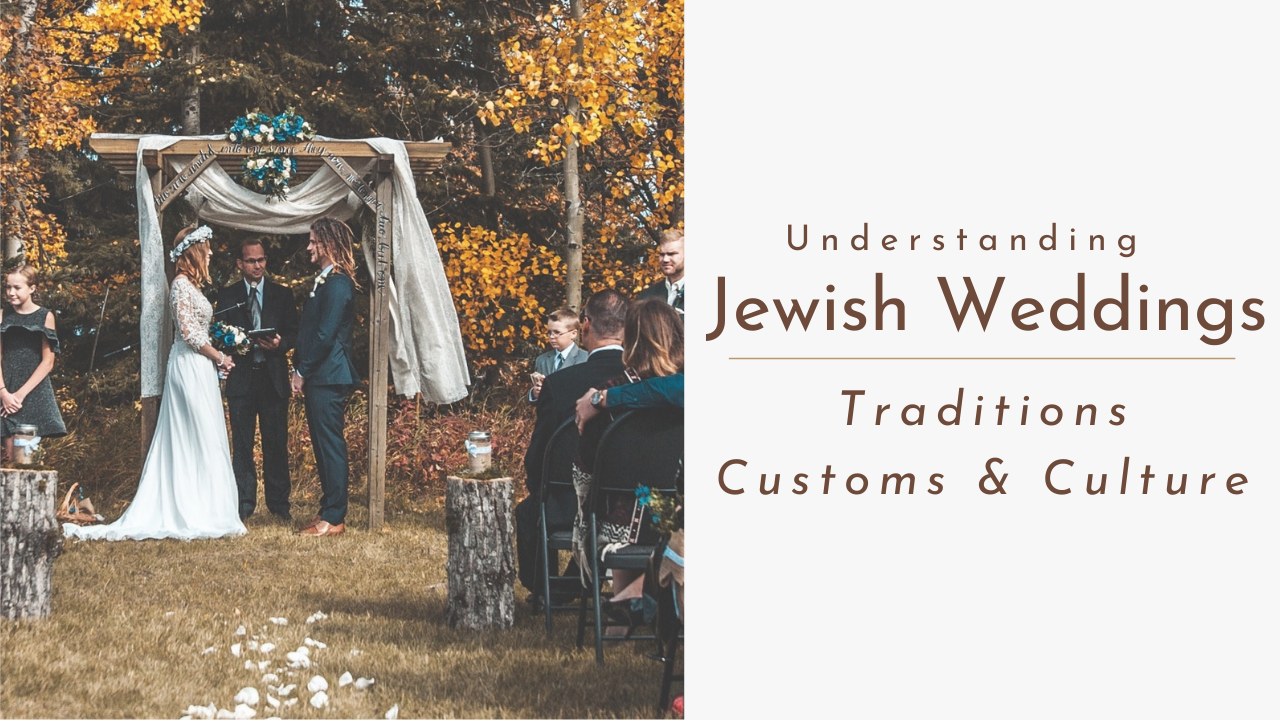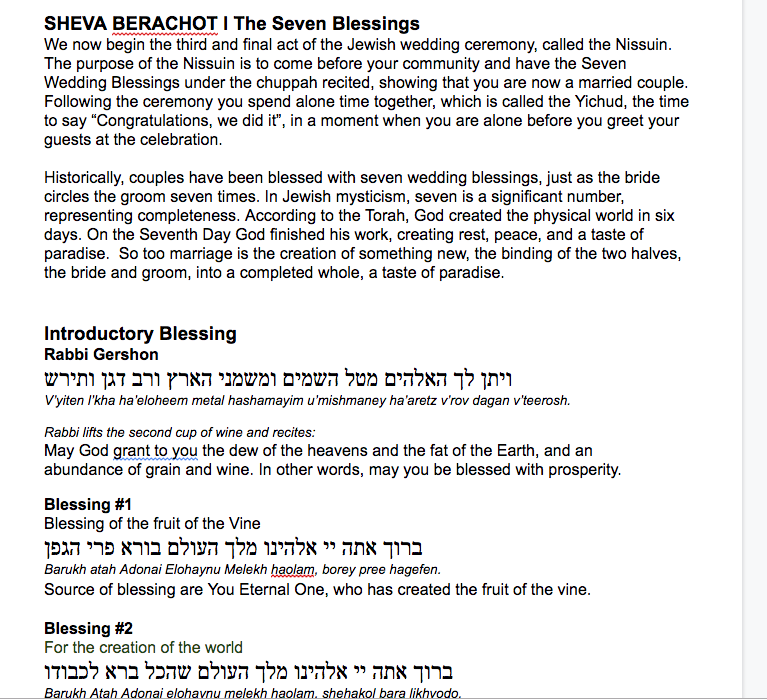
Understanding Jewish Wedding Traditions & Why It Matters
Are you planning on Incorporating Jewish family & cultural traditions into your Interfaith Wedding? Not sure. Maybe it's been challenging trying to plan this part of your wedding and you are wondering why it is important to include these special moments into your celebration. Is it really worth the extra effort?
Planning an interfaith or blended culture wedding requires thought sensitivity and a bit of creativity. In a sense, you are showing the world how you, your beliefs and traditions will join and interact going forward after your wedding.
Taking the extra time to plan, your wedding can be an enlightening, unifying experience for you, your families and your wedding guests. Adding your personal touches from both of your backgrounds, adds a unique quality to your wedding day and forms a good basis for your life moving forward. After all your wedding day is the birthday of your marriage!
Why is it Important to preserve family and cultural wedding traditions?

Traditions are the glue that keeps families, communities, cultures and religious groups together. Research shows that traditions are important in building strong family relationships between generations. Traditions are stories, beliefs, rituals and customs that are passed from one generation to the next. ... Hebrew “l’dor v dor” from generation to generation. Passing the torch is an Olympic tradition that stem thousands of years, since the first Greek Olympics.
It is important to preserve our cultural heritage, because it keeps our integrity as a peoplehood. The relevance of intangible cultural heritage is not the cultural manifestation itself but rather the wealth of knowledge and skills that is transmitted through it from one generation to the next.
Being a part of the special things our family does helps us to have that sense of belonging. When a couple is from different cultural and religious backgrounds, it’s very important to honor them with respect. How you go about doing this requires taking a deeper look at what traditions are really important to take with you on your new life’s chapter.
Most traditions can be celebrated in a universal way, adapting language so that no one is offended. Working with over 300 couples over the past 18 years, we find that some family members and friends come to an interfaith wedding feeling dubious and even leery, only to find themselves leaving with a great sense of relief. No one was offended, everyone was included and it was truly educational and unique experience that they will remember for the rest of their lives. Rituals from different traditions and heritage add a depth of meaning that can leave you feeling inspired and encouraged. However, it requires the goal of everyone involved in the planning towards equality and understanding for this to be successful.
You Choose How The Style You Want
In our modern weddings, there is no right or wrong way to celebrate your heritage at your way. There are more than one way to say "I Do" and Yehudit Steinberg, founder of the Jewish Interfaith Wedding Network shows you how to have the wedding you want with as many or few cultural and religious traditions. She's a master at this craft with over 500 successful fusion weddings under her belt since she started back in 2003.
Some people choose to celebrate their traditions from a religious and cultural perspective. While others choose to leave religion out of it, and celebrate the cultural traditions. No matter which way you choose, when one of the partners are Jewish there are some considerations to take into account at the beginning of your engagement, before you even spend a dime.
Jewish weddings are steeped in meaningful rituals and focus intently on the significance and purpose of marriage between the couple and their obligation to one another. Weddings in the U.S. are mindful of religious, cultural and the commitment they are making to each other as they enter into marriage.
Understanding The Different American Jewish Communities

Judaism is not a one size fits all belief system. It’s often said that “two Jews, five opinions, because we are taught to question. There is not a set doctrine, and Jews are not required to accept anything just on faith. It is not a Faith Based religion, it’s a religion based on facts, logic, analysis and tradition. This is a big difference in mindset compared to those who are steeped in a faith based religion. Therefore open lines of communication from the start become very important. You have to know your boundaries, which is why you have to talk it out from the start. A faith based religion requires you believe without question and the Jewish tradition requires that you question belief.
Traditions Are Practiced Based On The Region Of The Family Origin

The Jewish community divides itself into two main regional groups, Askenzai and Sephardi, with a few sub groups based on where their ancestors originated. Ashkenazi Jews are from Germany, Russia, Lithuania and Eastern European countries, while Sephardic Jews are from Spanish and Mediterranean countries Greece, Italy, Turkey, South America etc.
Ashkenazi Jews from Eastern Europe
The Askenazi make up the vast majority of Jews in U.S. and are divided into 3 main categories: Orthodox, Conservative, Reform, plus there are more contemporary movements such as Reconstruction, Renewal and Humanist.
Sephardic Jews from Spain, Portugal, North Africa and Middle East
Sephardic Jews are the Jews of Spain, Portugal, North Africa and the Middle East and their descendants. The adjective "Sephardic" and corresponding nouns Sephardi (singular) and Sephardim (plural) are derived from the Hebrew word "Sepharad," which refers to Spain.Today, Sephardi are the vast majority in Israel due to migration from hostile Arab nations.
Similar Traditions Practiced At All Jewish Traditional Weddings
While customs and traditions may vary between different community of Jews, at the core every Jewish wedding ceremony consists of the following:
Chuppah [Wedding Canopy]

Ketubah [Marriage Contract]

Rabbi is reviewing and completing the Ketubah [Jewish Marriage Contract] for the couple and 2 witnesses to sign during the pre-wedding ritual ceremony.
Ring Exchange 
Notice that the groom is placing the ring on the brides forefinger, not her ring finger. This is a little known Jewish tradition with a couple beautiful symbolic meanings.
Kiddush [Wine Blessing]

Wine symbolizes the cup of joy at all happy Jewish events, and a wedding is certainly one where this is part of the ceremony.
Seven Wedding Blessings

One of the most important parts of the Jewish ceremony is the recitation of the Seven Wedding Blessings known as Sheva Brachot. This part of the ceremony can be very creative interpretations and include family and friends. Although many are not practicing the Jewish religion, couples who want to honor their Jewish roots and the underlying values, that are still meaningful to them, choose to include this part of the ceremony.
Break The Glass

The most famous Jewish Wedding tradition. It's included in most ceremonies where couples wan t to have at least one tradition represented. Several meanings for the smashing of the glass. Your choice which one you want to use at your wedding!
Yichud [Time Alone]

A very practical Jewish Tradition worth keeping is called Yicud [Alone Time] just after the ceremony before the couple head for family photos or to the reception. This gives them 5-10 minutes to congratulate each other and have a few appetizers and a drink. Another Jewish tradition is to fast before your wedding, which more traditional couples would follow. Having something to eat at this time would be most important.
The Celebration [Reception]

What is the symbolism of a Jewish Wedding? How is it different from some other cultures?
The symbolism in the Jewish wedding ceremony is based on the Tradition of a couple coming together in marriage to create a new home for themselves and the family that will come in the future. Rather than cutting ties from their birth families, it’s a sense of bringing the families together into one larger family, as part of a community.
For example, the chuppah represents the new home the couple making, with all the immediate family standing with them under the chuppah or holding the four corners up.
And the sides are open to represent the welcoming of their friends, family and community to their new home.
Traditions Give Deeper Meaning to Life Cycle Events
Traditions cause us to pause and remember where we came from and then reflect on how it’s relevant today for us at this critical point in our lives when we are leaving the paradigm of single hood and entering into a new chapter of marriage, where we are bringing together a new set of values beliefs and traditions from our partners background. We are opening a new door together, and this is a time to remember and reflect how we are going to proceed going forward. A lot will change in our lives once we are married and the family and community dynamics shift as well.
Bringing together the important family and cultural traditions from both sides, can create happy and lasting memories, holding a special place in our lives as we grow older.
Tradition is saying, “remember.” Think, but remember. Question, but remember. Grow and change, but remember. Remember who we are as humans, where we came from and how we can take the knowledge, wisdom and experiences transmitted to us from generations afar to live a life more beautiful - and more meaningful.
Tradition. “Without [it],” says the character Tevye in the famous story of a Russian family forced to flee their homeland, “our lives would be as shaky as...a fiddler on the roof.”
The ideas of incorporating cultural traditions into your wedding are endless. For example, a bride from Mexican heritage and a Jewish groom from NYC broke the glass at the end of the ceremony and danced the Hora, a Jewish dance, during the reception. They had a taco station, Gave tequila shots as favors. Their cake had both of our flags -Mexico and the USA, plus a Mariachi band for the cocktail hour and ceremony.
It’s been our experience over the past 18 years that the couples who take the time to remember, learn, honor and reflect and imbue these personal aspects into their wedding celebrations, start their new life together with more meaning and their families come together with a new perspective of one another.
#WeddingIdeas #WeddingInspiration #WeddingPlanning #JewishInterfaithwedding #JewishWedding # interfaithwedding
Stay connected to Y Steinberg Designs news, classes, and updates!
Join Y Steinberg Designs' newsletter list to receive the latest news, classes and updates from Yehudit (yahoo-deet) .
Don't worry, your information will not be shared.
We send the newsletter monthly.
We hate SPAM. We will never sell your information, for any reason.
